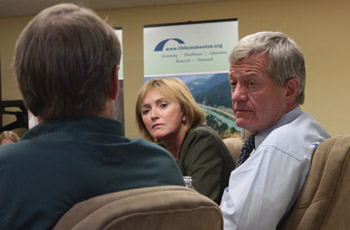LIBBY – Sen. Max Baucus doesn’t remember how many times he’s visited Libby in the last decade. Even an assistant can only offer an estimate – about two-dozen since news first surfaced that asbestos had sickened hundreds in Lincoln County.
Last week, Baucus was back in Libby, this time with Marilyn Tavenner, administrator for the Center for Medicare and Medicaid Services. The senator called Tavenner’s visit an opportunity to make sure Libby has an advocate in Washington D.C. after Baucus steps down in January 2015. Baucus announced his retirement in April, after more than 30 years in the U.S. Senate.
“I wrestled with the (decision to retire) for three months. It was the toughest decision I’ve ever made in my professional life,” he said, waiting for a slice of Huckleberry pie at the Libby Café. “(But) I’m not going anywhere. I’m moving home and I’m trying to sort of appoint myself an advocate for Montana. I just want to help Montana, and that means projects like Libby.”
In 1999, news broke that there had been hundreds of illnesses and deaths in Libby due to exposure to asbestos-laden vermiculate that was once mined north of town by the W.R. Grace and Company. The mine closed in 1990, but the deadly after effects remained and, in the last decade, some 2,000 current or former residents have been diagnosed with asbestos-related diseases and at least 400 have died. In 2002, Libby was declared an Environmental Protection Agency Superfund Site.
Baucus was one of the first politicians to visit Libby after the story broke, recalled Gayla Benefield, 69, whose parents both died from the exposure. Benefield was diagnosed with asbestos-related diseases in 2001.
“He came to my home in January 2000 and spoke to a group of 20 of us,” she said. “He promised us he would help and he’s been in contact ever since … We wouldn’t have been able to do everything we have without the assistance from Max.”
Baucus pressured the EPA to declare Libby a Public Health Emergency in 2009 and he was instrumental in funneling funds to the beleaguered community, including a $10 million grant to help Lincoln County health care providers screen for asbestos-related diseases.
In the last decade, he has also brought numerous Washington D.C. officials to Libby, including Health and Human Services Secretary Kathleen Sebelius and former EPA Administrator Lisa Jackson.
“One thing the senator said to me is that I need to come here, to meet you, to understand what happened here,” said Tavenner, who was confirmed by the Senate in May as the new Medicare and Medicaid administrator.
Tavenner’s visit to Libby last week included a stop at the cemetery where many victims of asbestos-related diseases have been buried. Baucus introduced Tavenner to family members of asbestos victims before heading to the Libby Café for lunch.
The next stop was the CARD Clinic, established in 2003 as an independent research and health care facility created specifically to address Libby amphibole asbestos. Tavenner spoke to patients and their family members about the possible expansion of the Medicare Pilot Program.
Established in 2011, the program helps patients in Flathead and Lincoln counties pay for a variety of services, including home assistance, transportation costs, medications, home modifications and various medical equipment. According to CARD, 855 patients are currently enrolled in the pilot program and 472 are receiving some sort of ongoing services from it. In the past two years, CARD has screened more than 1,800 people and 923 have been diagnosed with asbestos-related diseases. More than one-third of those diagnosed in the last two years live outside of Flathead and Lincoln counties and can’t get access to Medicare’s additional services offered to other victims. Among them is Theresa Ross’ father who lives in Bull River in Sander County, just eight miles away from Lincoln County.
 |
|
Medicare and Medicaid Services Administrator Marilyn Tavenner, center, and Sen. Max Baucus listen to Dr. Brad Black of the CARD Clinic on a visit to Libby on Aug. 21. – Justin Franz | Flathead Beacon |
“He’s going to need help, he’s going to need more services,” Ross told Tavenner.
Tavenner said provisions included in the Affordable Care Act make it possible to expand the pilot program this year to victims outside of Flathead and Lincoln counties. She said her visit to Libby made her realize the importance of expanding the program.
“It’s one thing to do it as a paper exercise,” she said. “It’s another to come here, to meet the people who lost friends and family … It gives me concrete facts to bring back (to Washington D.C.) and it makes it real.”
Baucus said he plans on doing everything he can for Libby during his final months in office, adding he has more time now that he doesn’t have to worry about reelection.
“I think Libby could have easily been forgotten,” said CARD Chief Executive Officer and Medical Director Dr. Brad Black. “But (Baucus) has looked at the situation and tried to find help in every way he could… We hate to see him leave, but we all know he needs a change and we’re grateful for what he’s done.”
The senator brushed off concerns that Libby will be forgotten when he leaves office in 2015. He vowed to help whoever replaces him in the Senate advocate for Libby, regardless of political affiliation.
“I just want to make sure the people of Libby get justice,” he said. “And I’m not going to rest until they do.”